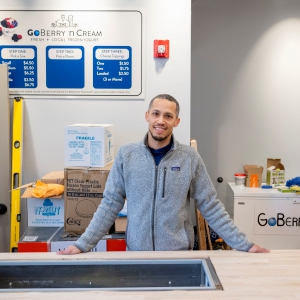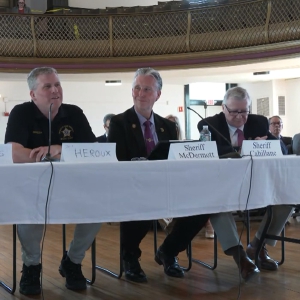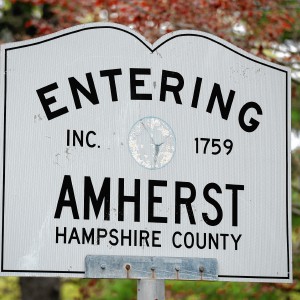The bikes are rolling again: Grounded since spring of 2023, ValleyBike is officially back in business
|
Published: 08-12-2024 5:32 PM
Modified: 08-12-2024 9:17 PM |
NORTHAMPTON — Bike riders in the Pioneer Valley are once again able to use the ValleyBike Share system, with transportation stations reopening from Amherst to Springfield after being shut down for more than a year.
The city of Northampton held a grand reopening for the ValleyBike system in Pulaski Park on Monday afternoon, with city and town officials from Northampton, Amherst and Chicopee on hand for the ribbon-cutting ceremony. Representatives for Drop Mobility, the new provider company for the ValleyBike system, were also present. Commemorative merchandise including water bottles, sunglasses and bicycle helmets were given out as part of the festivities, and several of the electric-powered bikes were made available for test drives, with riders including Northampton Mayor Gina-Louise Sciarra and Chicopee Mayor John Vieau.
“When ValleyBike shut down in the spring of ’23, I feel like our network felt right away the the impact of that loss within all of our communities,” Sciarra said during the ceremony. “Not only did we lose the recreational use of ValleyBike, we truly lost a critical piece of transportation services that residents had come to rely on for daily needs.”
ValleyBike closed before getting going last year when the original provider of the bike services, Bewegen, declared bankruptcy. A search for a new provider soon followed, led by the city of Northampton, which is responsible for administering the ValleyBike system across the eight cities and towns (along with the UMass Amherst campus) the program serves: Northampton, Easthampton, Amherst, South Hadley, Holyoke, Chicopee, West Springfield and Springfield.
In May, the city announced that it had contracted with Drop Mobility to become the new provider for ValleyBike Share. The company, founded in Toronto and headquartered in San Francisco, also provides bike operations in cities across the U.S. such as New Orleans, Kansas City and Colorado Springs.
“It’s been a huge effort from all the partner communities to get it back up and running,” said Amber Wason, Drop Mobility’s vice president of growth and innovation, who was present at the ceremony. “Our role has been to support the relaunch, so we’re just excited to get to be a part of this.”
The ceremony also debuted newer model bicycles, designed by Drop Mobility, for the ValleyBike system. The new models will initially only be available from stations in Springfield, but will gradually be incorporated into other stations through the company’s three-year contract with the city. The older bikes have been tuned up and will be in use in other participating communities.
Edgardo Cancel, the lead technician for ValleyBike system, said the newer bikes are lighter in weight than the previous Bewegen bikes, and also are powered via a manually replaceable battery, rather than a charging station, meaning the building of additional charging outlets will no longer be required going forward.
Article continues after...
Yesterday's Most Read Articles
 Five UMass Amherst students have visas, student status revoked
Five UMass Amherst students have visas, student status revoked
 State senators organize Trump defense: Comerford a leader on Response 2025 initiative
State senators organize Trump defense: Comerford a leader on Response 2025 initiative
 Long-vacant former Faces spot in Northampton gets new tenant
Long-vacant former Faces spot in Northampton gets new tenant
 ‘Delightful’ Northampton store shopping guide Jane Hertz, 88, seeking next gig
‘Delightful’ Northampton store shopping guide Jane Hertz, 88, seeking next gig
 Here come the sweetness: Four new businesses prepping to open in downtown Northampton
Here come the sweetness: Four new businesses prepping to open in downtown Northampton
 Local ‘Hands Off!’ standouts planned as part of national effort
Local ‘Hands Off!’ standouts planned as part of national effort
“We won’t need all that hard, heavy equipment, just a regular bike rack,” Cancel said. “We [ValleyBike staff] will come around, just like we already do to check on the bikes, and if a bike is reading low battery, we just swap it out with another one.”
This first year will employ a fleet of 350 bikes, of which 300 will be the Bewegen bikes, while 50 of the bikes will be the newer Drop Mobility models. The fleet size is less than half of what had previously been in the ValleyBike system before the shutdown, although Northampton Planning & Sustainability Director Carolyn Misch said the hope was to eventually incorporate more bikes back into the system.
“We knew we couldn’t afford more than 500 for the first year,” Misch said. “Even though we had a bigger stock number [of bikes], there were many that were beyond repair.”
During the ceremony Monday, Misch also teased the idea of making ValleyBike a year-round program, allowing them to be used in the winter in addition to the fall, spring and summer months.
“That’s obviously critical as part of the transportation piece, to make sure there’s a continuous access for folks throughout the year,” Misch said. “We really want to explore that in earnest.”
Those seeking to use ValleyBike Share must have the ValleyBike app installed on their cellphones. Plans available include a pay-as-you-go option that costs 25 cents a minute, plus $1 to unlock the bike; a monthly plan that costs $25 and includes 30 minutes of free ride time per day, followed by a 15 cents per minute charge afterward; and an equity membership plan available for people who either qualify for SNAP, MassHealth/Medicaid and/or Social Security Disability Insurance that costs $4 month and includes 60 minutes of free ride time per day, followed by 15 cents per minute afterward.
Residents who sign up before Aug. 31 can get a special flat rate of $49 through the end of this year.
Bike-sharing is intended for recreational trips or short commutes, generally an hour or less. The bikes can be picked up and returned at any of the stations. In addition to providing a secure dock for the electric-assisted bicycles, the stations charge the batteries that power the bikes’ pedal-assist motors. The motors, which can be turned off, are run by the bike pedals.
The ValleyBike share program began in 2018. Communities served by the program combine to cover more than $70,000 in administrative costs to run the service. The Massachusetts Department of Transportation and the Pioneer Valley Metropolitan Planning Organization also provide capital funding for equipment, and local sponsors such as Smith College and Cooley Dickinson Hospital also underwrite certain costs.
Alexander MacDougall can be reached at amacdougall@gazettenet.com.













 Alex Galloway takes office as Deerfield Planning and Economic Development Coordinator
Alex Galloway takes office as Deerfield Planning and Economic Development Coordinator Free jail calls stressing sheriffs’ budgets, staff
Free jail calls stressing sheriffs’ budgets, staff Hatfield Select Board challenge sole contested race in May 20 election
Hatfield Select Board challenge sole contested race in May 20 election Amherst finance director to return to UMass
Amherst finance director to return to UMass
